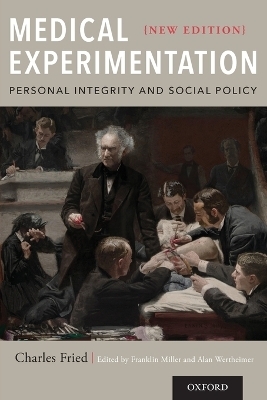
Medical Experimentation
Oxford University Press Inc (Verlag)
978-0-19-060272-7 (ISBN)
Charles Fried is a full time member of the faculty and Beneficial Professor of Law at Harvard Law School. A former Associate Justice of the Supreme Judicial Court of Massachusetts, he has served on the Harvard Law School faculty since 1961. From 1985-1989 he was Solicitor General of the United States.
Introduction to the Second Edition-Franklin G. Miller and Alan Wertheimer
Chapter 1: Introduction
Chapter 2: The Legal Context of Medical Experimentation
2.1. General principles
2.2. Consent
2.2.1. The meaning of consent
2.2.2. Qualifications of the requirement of informed consent
2.2.3. Overriding the patient's failure to consent
2.2.4. Withdrawal of consent and the continuing duty to disclose
2.3. General legal principles applied to medical experimentation
2.3.1. Non-therapeutic experimentation
2.3.2. Therapeutic experimentation
2.3.3. Mixed therapeutic and non-therapeutic research: The problem of the RCT
2.4. Participation in experimentation as a condition of medical treatment
2.5. Statutes and regulations
Chapter 3: The Concept of Personal Care
3.1. Do randomized clinical trials really pose a dilemma?
3.1.1. The burdens on the experimental subject
3.1.2. Is personal care a coherent concept?
3.1.3. The terms of the conflict: Distributive justice and rights
3.2. Distributive justice
3.3. The good of personal care
Chapter 4: Personal Care: Interests or Rights
4.1. Economic theory and medical care
4.1.1. Efficiency
4.1.2. Distribution
4.2. The concept of rights
4.2.1. Rights and efficiency
4.2.2. Negative and positive rights
4.3. Personal integrity, the goals of medicine, and rights in personal care
4.3.1. Personal integrity
4.3.2. Sickness and death
4.3.3. The function of medical care
4.3.4. Rights in medical care: lucidity, autonomy, fidelity, humanity
Chapter 5: Realizing Rights-Medical Care in General
5.1. Preliminary speculation: the antinomy of the personal and the social
5.1.1. Political versus ethical theory
5.1.2. The theory of democracy
5.1.3. What are we entitled to ask of theory?
5.2. Two models of the health care system
5.2.1. Primary care
5.2.2. The hospital
5.2.3. The department of health
5.3. The antinomy confronted: putting the two models together
5.3.1. The rightness of queuing
5.3.2. The obligations of bureaucrats
Chapter 6: The Practice of Experimentation
6.1. Some recent RCT's
6.1.1. The Veterans' Administration cooperative study group: clinical trial of anti-hypertensive therapy
6.1.2. The university group collaborative oral anti-diabetic agent randomized clinical trial
6.1.3. Coronary by-pass surgery
6.1.4. The Salk polio vaccine trial
6.2. The concept of professional knowledge
6.3. Rights in experimentation
6.3.1. Lucidity and the duty of candor
6.3.2. Autonomy and the concept of professional accountability
6.3.3. Fidelity and humanity
6.4. Rights in experimentation implementation and accommodations
6.4.1. Alternatives to randomized controlled trials
6.4.2. Accommodation by differentiation of role
6.4.3. Compensation and participation
From Medical Experimentation to Non-Medical Experimentation: What Can and Cannot be Learned from Medicine as to the Ethics of Legal and Other Non-Medical Experiments?-I. Glenn Cohen and D. James Greiner
Concluding Reflections-Charles Fried
Index
| Erscheinungsdatum | 25.05.2016 |
|---|---|
| Verlagsort | New York |
| Sprache | englisch |
| Maße | 208 x 137 mm |
| Gewicht | 295 g |
| Themenwelt | Geisteswissenschaften ► Philosophie ► Ethik |
| Medizin / Pharmazie ► Medizinische Fachgebiete ► Medizinethik | |
| Studium ► Querschnittsbereiche ► Geschichte / Ethik der Medizin | |
| Studium ► Querschnittsbereiche ► Prävention / Gesundheitsförderung | |
| ISBN-10 | 0-19-060272-4 / 0190602724 |
| ISBN-13 | 978-0-19-060272-7 / 9780190602727 |
| Zustand | Neuware |
| Haben Sie eine Frage zum Produkt? |
aus dem Bereich


